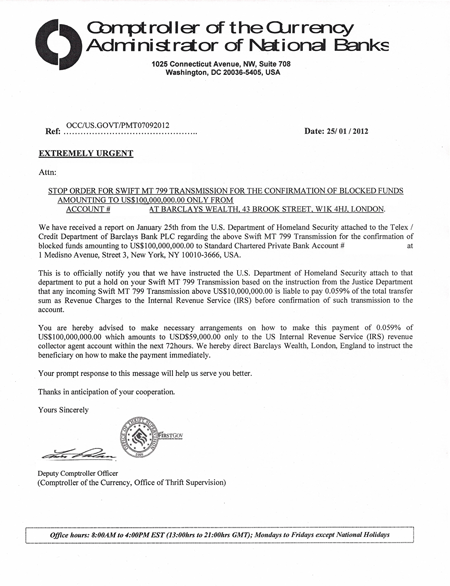Fictitious correspondence, allegedly issued by the Office of the Comptroller of the Currency (OCC) regarding funds purportedly under the control of the OCC and other government entities, is in circulation. Correspondence may be distributed via e-mail, fax, or postal mail.
Any document claiming that the OCC is involved in holding any funds for the benefit of any individual or entity is fraudulent. The OCC does not participate in the transfer of funds for, or on behalf of, individuals, business enterprises, or governmental entities.
The letters may indicate that funds are being held by the OCC, the U.S. Department of Homeland Security, or the U.S. Department of Justice because of the need for payment of a 0.059 percent revenue charge to the U.S. Internal Revenue Service.
The correspondence in question contains forged signatures of actual OCC officials. In addition, the material contains a fictitious mailing address that is not associated with the OCC.
Before responding in any manner to any proposal supposedly issued by the OCC that requests personal information or personal account information, or that requires the payment of any fee in connection with the proposal, you should take steps to verify that the proposal is legitimate.
At a minimum, the OCC recommends that you:
- Contact the OCC directly to verify the legitimacy of the proposal (1) via e-mail at occalertresponses@occ.treas.gov; (2) by mail to the OCC’s Special Supervision Division, 250 E St. SW; Mail Stop 2-7, Washington, DC 20219; (3) via fax to (202) 874-5214; or (4) by calling the Special Supervision Division at (202) 874-4450.
- Contact state and/or local law enforcement.
- File a complaint with the Internet Crime Complaint Center at www.ic3.gov, if the proposal appears to be fraudulent and was received via e-mail or the Internet.
- File a complaint with the U.S. Postal Inspector Service by telephone at (888) 877-7644, by mail at U.S. Postal Inspection Service, 222 S. Riverside Plaza, Suite 1250, Chicago, IL 60606-6100, or via online complaint form at:https://postalinspectors.uspis.gov/forms/MailFraudComplaint.aspx, if the proposal appears to be fraudulent and was delivered through the U.S. Postal Service.
Below is a copy of this fraudulent correspondence, which is being sent by fraudsters in an attempt to elicit funds and to gather personal information to be used in possible future identification theft.

